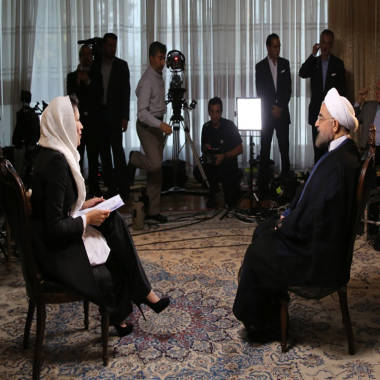Unlike his predecessor Mahmoud Ahmadinejad, Rouhani struck a moderate tone on many issues, but he deflected a question from NBC News' Ann Curry about whether he believed that the Holocaust was "a myth."
"I'm not a historian. I'm a politician," he replied. "What is important for us is that the countries of the region and the people grow closer to each other, and that they are able to prevent aggression and injustice."
Rouhani's comments came in his first interview with a U.S. news outlet since his June election. The interview was broadcast Thursday on TODAY.

David Lom / NBC News
NBC
News' Ann Curry speaks with Iranian President Hassan Rouhani on
Wednesday. It was Rouhani's first interview with a U.S. news outlet
since being elected.
Curry also asked Rouhani to respond to comments by Israeli President Benjamin Netanyahu, who has called him a "wolf in sheep’s clothing."
Rouhani described Israel as "an occupier and usurper government" that "does injustice to the people of the region, and has brought instability to the region, with its warmongering policies."
He added Israel "shouldn't allow itself to give speeches about a democratically and freely elected government."
Netanyahu has previously hinted at the possibility of Israeli military strikes on Iran over the country's controversial nuclear program if Western sanctions and diplomacy fail.
However, Rouhani also said it was important that countries across the Middle East learn to peacefully coexist.
"We are not seeking ... and looking for war with any nations. We are seeking peace and stability among all the nations in the region," Rouhani said.
In
an exclusive interview with NBC's Ann Curry, Iranian President Hassan
Rouhani said his country is asking for peace, stability and the
elimination of all weapons of mass destruction.
Rouhani replaced Ahmadinejad who had been quoted as describing the Nazi Holocaust as "a myth" while in office. In 2009, Ahmadinejad dropped language from a speech at a U.N. conference on racism that branded the Holocaust "ambiguous and dubious."Rouhani's comments underscored the shift in tone since he was elected with just over 50 percent of the vote. During his inaugural address, the new president spoke of engagement with the West to end bruising sanctions over his country’s controversial nuclear program.
Rouhani also appeared to pledge his support for increasing Iranians’ access to the Internet and other political and social freedoms.
"We want the people, in their private lives, to be completely free, and in today’s world having access to information and the right of free dialogue, and the right to think freely, is the right of all peoples, including the people of Iran," he said.
When asked whether his government would stop censoring the Internet, Rouhani said "a commission for citizens' rights" would be established.
"Does that mean that people in Iran will have access now to Twitter and to Facebook?" Curry asked.
"The viewpoint of the government is that the people must have full access to all information worldwide," Rouhani replied. "Our opinions on this should based on protection of our national identity and on our morals."
Officials
in Washington, D.C., say the time is right for Iran, which wants a deal
to get out from sanctions that are crippling its economy. NBC's Andrea
Mitchell reports.
In the interview with Curry, Rouhani also said his country will never develop nuclear weapons and that he has the clout to make a deal with the West on the disputed atomic program."In its nuclear program, this government enters with full power and has complete authority," he said, adding that Iran has repeatedly pledged that "under no circumstances would we seek any weapons of mass destruction, including nuclear weapons, nor will we ever."
Rouhani, who earned a Ph.D. from a Scottish university, was the only non-conservative in the field during the election to replace Ahmadinejad. He got more than 18 million votes while five conservative candidates combined garnered just under 18 million.
Rouhani also discussed how he and President Barack Obama have exchanged letters in which they traded views on "some issues."
"From my point of view, the tone of the letter was positive and constructive," Rouhani said of the note he got from the White House congratulating him on his election.
The two countries severed diplomatic ties in 1980 after students supporting the Iranian revolutionaries who overthrew the U.S.-backed Shah Mohammad Reza Pahlavi of Iran took 52 Americans hostage for 444 days.
"It could be subtle and tiny steps for a very important future," Rouhani told Curry. "I believe the leaders in all countries could think in their national interest and they should not be under the influence of pressure groups. I hope to witness such an atmosphere in the future."
Rouhani's is due to appear next Tuesday at the U.N. General Assembly — where Western diplomats regularly walked out during Ahmedinejad's fiery speeches.
NBC News' Tracy Connor and Henry Austin contributed to this report.
Related:
- Rouhani: Iran will never develop nuclear weapons
- Photos: Behind the scenes of Ann Curry's interview
- Is Iran coming in from the cold? Hints pile up
This story was originally published on Thu Sep 19, 2013 6:49 AM EDT
No comments:
Post a Comment